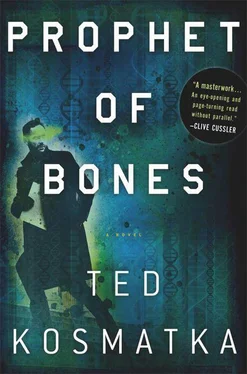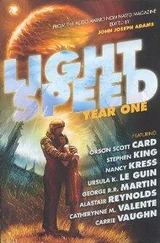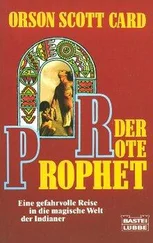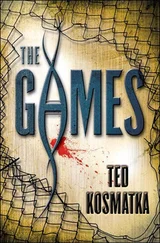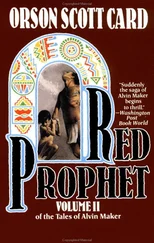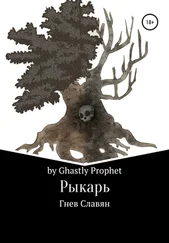“I understand that you’ve been through… an ordeal. But I think you’re making a rash decision.”
“I’m not.”
“We’d be promoting you above several senior samplers.”
“You keep calling it that.”
“It would be a promotion,” Belshaw snapped. Belshaw was used to getting his way. There was a brusqueness in him. Brusqueness was an asset whose value was not to be underestimated in an administrator’s career. Paul had often thought that managers failed or succeeded more on the basis of their temperaments than due to any other factor. But here was a man both smart and brusque. The kind of man for whom “no-nonsense” would doubtless appear no fewer than three times in any quarterly evaluation. The highest possible praise.
“How much longer were you planning on keeping me in sampling?” Paul asked.
“How long have you been with the company?”
“Four years.”
“Then another three at least.”
“So your plan was to move me eventually. I’d simply like you to bump that date forward. Keep my pay where it is now.”
Belshaw leaned back in his chair again, considering Paul across the broad surface of his desk. “Have you talked to your direct supervisor about this?”
“No.”
“Why come to me?”
“Because you can make it happen.”
“There is an established system in place. Why should we disregard the system and move you ahead of other samplers who’ve put in their time? Why move you to the front of the line?”
“Because I gave an eye.”
Belshaw closed his mouth. He looked at Paul for a long time. Paul had said it: the thing, of course, that was always under the surface. Obvious as a black leather eye patch. It was a betrayal; Paul saw that clearly in Belshaw’s eyes. It was a betrayal to mention his eye, to play that card. But Paul knew in that moment that he had won. He knew that Belshaw would give in. He could see it in the man’s face. He would give in, but he would not forget. Men like Belshaw didn’t appreciate being backed into corners. The silence drew out between them. “I will get back to you by the end of the week,” Belshaw said. He rose to his feet and extended his hand. The meeting was over.
Paul shook the proferred hand. He didn’t say thank you. He didn’t say anything. He simply nodded and left.
* * *
Later, Hongbin sat in Paul’s office. He leaned back, flinging his yo-yo. Down, up. Down, up. The string broke.
Hongbin was philosophical about it. “Now it is just a yo,” he said.
Paul thought of telling him. He thought of explaining everything. He thought of telling him about what had really happened on Flores, and about the sample he’d hidden and what he planned to do. But he couldn’t. It wouldn’t be fair to Hongbin. It wouldn’t be right to expose him to the risk.
“So you are leaving bones,” Hongbin said.
“No,” Paul said. “I’m never leaving bones.”
Evidence of Expansive Introgression
[Translated from Russian.]
The geographical distribution of the 25-microsatellite Y-chromosome haplogroup C3c was educed from the analysis of 4,600 blood samples taken from phyletic populations across Eastern Europe, Asia, and the Indian subcontinent. Analysis shows that the highest frequency of the 25-microsatellite sequence is found in southern Mongolia, with significant recurrence presenting across most of China, as well as among the Altaian Kazakhs of Russia and the Hazara of the Bolan Pass area of Pakistan. The limited variation of the 25-microsatellite marker demonstrates an anomalously young age for this group relative to other local haplogroup distributions, suggesting that this distribution resulted not from normal population expansion but from a series of “introgression events” into a preexisting population matrix. The current geographic range of the 25-microsatellite sequence is proximally bounded by the expansive limit of the Mongol Empire in the thirteenth century. This unusual distribution can best be explained as the genetic artifact of a massive reproductive advantage conferred on a single paternal lineage of that time period. The origin of this lineage likely traces to southern steppe tribes of Mongolia, and to Genghis Khan.
Paul received word on a Friday. There was no fanfare. The news arrived in his in-box; he was being transferred to testing the following Monday. A 7 percent pay raise. The paperwork called it a promotion.
Mr. Lyons came by and congratulated him and shook his hand. “Sorry to see you go,” he said. And Paul could tell that the man meant it. Paul’s own emotions were more conflicted on the matter.
On Saturday, he got blindingly, stupefyingly drunk for the first time since Flores. He took Sunday to recuperate, puking only once, his face resting on the cool white porcelain.
On Monday he left for work early, taking the scenic route. He wanted to see the water from the road. He crossed the bridge as the sun came up along the far side of the bay.
He got to the parking lot early and carded himself inside. The guard nodded to him as he crossed the lobby. Paul took the elevator to the fourth floor, where he was supposed to meet Janus, his new supervisor. The fourth-floor lobby was similar to the fifth, only instead of an elegant folding wall of glass origami, here the wall was smooth steel, with a single steel door on which the words GENE FREQ LAB was stenciled in bold block letters.
Home of the gene freqs. Gene freaks.
There was no bone-freq lab, but the third-floor workers were still called bone freaks. Paul figured it was like rhinos. The first rhinos discovered were called white rhinos in anglicized bastardization of the local dialect. It had nothing to do with color. Still, when a second species was discovered, there was never much doubt about what to call them: black rhinos. Defined by opposition. And never mind that both species were gray.
Paul tried the door. It was locked. A card swipe glowed red from the wall.
Paul had been trained in school to test DNA, isolating base-pair sequences from bones and junk and contaminants. The index was what mattered, though. The comparison assays. Without the index, there was nothing to compare the sequences to. It was just noise, raw code. Meaningless pattern.
You had to have the index to know what you were looking at.
That was what they did on the fourth floor, on the other side of this door he couldn’t open.
A little after nine o’clock, Janus finally arrived. He was lanky and ruddy, with florid, pockmarked skin and a down-turned mouth. His thick, strawberry hair paid for his face. Although he was well into his sixties, his hair was nothing short of luxuriant. The first time Paul had seen him walking the halls, he’d assumed it was a hairpiece, but it wasn’t. Janus combed it straight back from his forehead, as if to accentuate the fact that his hairline hadn’t crept back a millimeter since grade school. His eyes were small and sharp and hazel.
“I see you’re here early?” Janus said. Janus, Paul knew, liked asking questions that were really statements. That way you couldn’t disagree with him.
“Yeah,” Paul said. “Early bird and all that.”
Janus looked at him, wary condescension on his pitted face. Then the look changed to pity as his gaze lingered on Paul’s eye patch. Somehow that was worse. Paul wondered what Janus had been told about the transfer. Did he know how hard Paul had pushed for it? Did he know he’d jumped his place in line?
“We’ll start with you making the fixative,” Janus said, then turned, swiped his card, and opened the door to the lab.
* * *
Janus led him down gleaming halls, past rows of windowless clean rooms, past men in white paper jumpsuits who carried steel trays crammed with samples in agarose gel. On the other side of glass doorways, men faced Pyrex isolation booths, arms extended through long latex gloves that stretched into the booths’ interiors. Paul and Janus passed a small lounge area; a vending machine hummed in the corner while researchers stood talking and sipping their coffee.
Читать дальше
